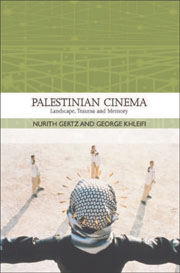Book contents
- Frontmatter
- Contents
- TRADITIONS IN WORLD CINEMA
- Dedication
- Introduction
- 1 A Chronicle of Palestinian Cinema
- 2 From Bleeding Memories to Fertile Memories
- 3 About Place and Time: The Films of Michel Khleifi
- 4 Without Place, Without Time: The Films of Rashid Masharawi
- 5 The House and its Destruction: The Films of Ali Nassar
- 6 A Dead-End: Roadblock Movies
- 7 Between Exile and Homeland: The Films of Elia Suleiman
- Conclusion
- Epilogue
- Bibliography
- Filmography
- Index
Epilogue
Published online by Cambridge University Press: 05 August 2013
- Frontmatter
- Contents
- TRADITIONS IN WORLD CINEMA
- Dedication
- Introduction
- 1 A Chronicle of Palestinian Cinema
- 2 From Bleeding Memories to Fertile Memories
- 3 About Place and Time: The Films of Michel Khleifi
- 4 Without Place, Without Time: The Films of Rashid Masharawi
- 5 The House and its Destruction: The Films of Ali Nassar
- 6 A Dead-End: Roadblock Movies
- 7 Between Exile and Homeland: The Films of Elia Suleiman
- Conclusion
- Epilogue
- Bibliography
- Filmography
- Index
Summary
The writing of this book was completed in 2003. While it was being prepared for publication, several important events took place in Palestinian cinema and some of its best films were produced. We can only refer to these films in brief, hoping that additional books written in due course will fill the gap.
The first Palestinian film to transcend the local scene and reach an inter – national audience was released in 2005. It won the European Film Academy Award for best script, the 2006 best foreign film award at the Golden Globes, and was also nominated for the best foreign film award at the Oscars. That film was Paradise Now.
Paradise Now was financed as a German, Dutch, and French co-production, but presented at the Oscars as a “Palestinian film.” From the onset, the film was highly controversial in Israel, since it was the first Palestinian feature film to deal directly with the issue of the suicide attacks. Director Hani Abu-Assad and producer Amir Harel applied in 2003 for a public grant from the Israeli Film Fund. Several fund members denied their request and one, the writer Irit Linor, harshly criticized the film, which she called “a moving and high-brow Nazi film” (Linor, Ynet, 2006. Anti-Semitism Now (7 February)). After it won the Golden Globe award no Israeli distributor agreed to take on the film and show it in Israel. Consequently, it was only screened at the cinematheque, enjoying little success.
- Type
- Chapter
- Information
- Palestinian CinemaLandscape, Trauma and Memory, pp. 193 - 199Publisher: Edinburgh University PressPrint publication year: 2008



